
Aloysius Tyrone Foster is an American jazz drummer. Foster played with Miles Davis during the 1970s and was one of the few people to have contact with Davis during his retirement from 1975–1981. Foster also played on Davis's 1981 comeback album The Man with the Horn. He was the only musician to play in Davis's band both before, and after, his retirement. He has toured extensively with Herbie Hancock, Sonny Rollins, and Joe Henderson.

Alfred McCoy Tyner was an American jazz pianist and composer known for his work with the John Coltrane Quartet and his long solo career afterwards. He was an NEA Jazz Master and five-time Grammy award winner. Unlike many of the jazz keyboardists of his generation, Tyner very rarely incorporated electric keyboards or synthesizers into his work. Tyner has been widely imitated, and is one of the most recognizable and influential pianists in jazz history.
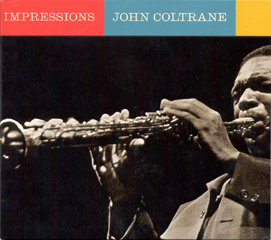
Impressions is an album of live and studio recordings by jazz musician John Coltrane, released by Impulse! Records in July 1963.
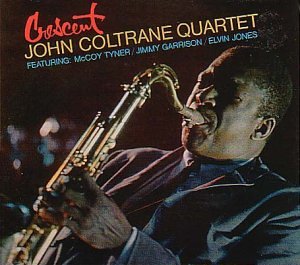
Crescent is a 1964 studio album by jazz musician John Coltrane, released by Impulse! as A-66. Alongside Coltrane on tenor saxophone, the album features McCoy Tyner (piano), Jimmy Garrison and Elvin Jones (drums) playing original Coltrane compositions.

The Real McCoy is the seventh album by jazz pianist McCoy Tyner and his first released on the Blue Note label. It was recorded on April 21, 1967 following Tyner's departure from the John Coltrane Quartet and features performances by Tyner with tenor saxophonist Joe Henderson, bassist Ron Carter and drummer Elvin Jones. Producer Alfred Lion recalls the recording session as a "pure jazz session. There is absolutely no concession to commercialism, and there's a deep, passionate love for the music embedded in each of the selections".
"Naima" is a ballad composed by John Coltrane in 1959 that he named after his wife, Juanita Naima Grubbs. Coltrane first recorded it for his 1959 album, Giant Steps, and it became one of his first well-known works.

George Mraz was a Czech-born American jazz bassist and alto saxophonist. He was a member of Oscar Peterson's group, and worked with Pepper Adams, Stan Getz, Michel Petrucciani, Stephane Grappelli, Tommy Flanagan, Jimmy Raney, Chet Baker, Joe Henderson, John Abercrombie, John Scofield, and Richie Beirach, among others.

Coltrane is a studio album by jazz saxophonist John Coltrane, released in 1962 by Impulse! Records. When reissued on CD, it featured a Coltrane composition dedicated to his hero "Big Nick" Nicholas that Coltrane would record later the same year for his Duke Ellington collaboration Duke Ellington & John Coltrane. The composition "Tunji" was written by Coltrane in dedication to the Nigerian drummer Babatunde Olatunji. Overlooked on its original release, Coltrane has since been regarded by music journalists as a major recording in the saxophonist's discography.
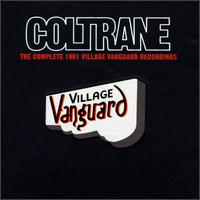
The Complete 1961 Village Vanguard Recordings is a box set by jazz musician John Coltrane, issued posthumously in 1997 by Impulse! Records, catalogue IMPD4-232. It collects all existing recordings from performances by the John Coltrane Quintet at the Village Vanguard in early November, 1961. Five selections had been issued during Coltrane's lifetime on the albums Live! at the Village Vanguard and Impressions. Additional tracks had been issued posthumously on the albums The Other Village Vanguard Tapes, Trane's Modes and From the Original Master Tapes.

Echoes of a Friend is a 1972 album by jazz pianist McCoy Tyner released on the JVC label, and later on the Milestone label. It was recorded in Tokyo, Japan, on November 11, 1972, and features Tyner in a solo piano tribute to John Coltrane.

Enlightenment is a live album by jazz pianist McCoy Tyner released on the Milestone label. It was recorded at the Montreux Jazz Festival in Switzerland on July 7, 1973 and features Tyner in performance with Azar Lawrence, Joony Booth and Alphonse Mouzon.

Trident is a 1975 album by jazz pianist McCoy Tyner (1938-2020), his eighth to be released on the Milestone label. It was recorded in February 1975 and features performances by Tyner with bassist Ron Carter and his former John Coltrane bandmate, drummer Elvin Jones (1927–2004). It is available on CD. Unusually, Tyner plays harpsichord and celesta along with piano.
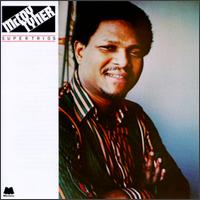
Supertrios is a 1977 album by jazz pianist McCoy Tyner, his eleventh to be released on the Milestone label. It was recorded in April 1977 and features performances by Tyner with two rhythm sections: bassist Ron Carter and drummer Tony Williams on the first half of the album, and bassist Eddie Gómez and drummer Jack DeJohnette on the second.

The Greeting is a 1978 live album by jazz pianist McCoy Tyner, his thirteenth release on the Milestone label. It was recorded in March 1978 at the Great American Music Hall and features performances by Tyner with a sextet featuring tenor saxophonist George Adams, alto saxophonist Joe Ford, bassist Charles Fambrough, drummer Woody Theus and percussionist Guilherme Franco. Tyner’s performance of John Coltrane's "Naima" is a piano solo.

Horizon is a 1979 album by jazz pianist McCoy Tyner released on the Milestone label. It was recorded in April 1979 and features performances by Tyner with alto saxophonist Joe Ford, tenor saxophonist George Adams, violinist John Blake, bassist Charles Fambrough, drummer Al Foster and percussionist Guilherme Franco.
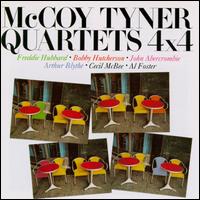
Quartets 4 X 4 is a 1980 album by jazz pianist McCoy Tyner released on the Milestone label. It was recorded in March and May 1980 by Tyner with bassist Cecil McBee and drummer Al Foster and featuring trumpeter Freddie Hubbard, guitarist John Abercrombie, vibraphonist Bobby Hutcherson and alto saxophonist Arthur Blythe, each for one side of the original double LP. The album was digitally remastered and first issued on a single CD in 1993.

Soliloquy is a 1991 album by McCoy Tyner released by Blue Note Records. Like Revelations (1987) and Things Ain't What They Used to Be (1989) Soliloquy was recorded at Merkin Hall without an audience and features solo performances by Tyner. The AllMusic review by Scott Yanow states that "McCoy Tyner always sounds in prime form and these diverse songs bring out the best in his passionate style. Highly recommended."

Live in Warsaw is a 1991 live album by McCoy Tyner that was released by Who's Who in Jazz. The album was recorded for a television broadcast by Polish Channel 1 in October 1991 at the Operatka House in Warsaw, Poland with a solo performance by Tyner. The Allmusic review by William Ruhlmann states that, "A virtual retrospective on a long career by a still-vital artist, Live in Warsaw offers the listener an opportunity to hear Tyner's mature reflections on the music of his past and present in an unfettered context".

McCoy Tyner with Stanley Clarke and Al Foster is an album by McCoy Tyner released on the Telarc label in 2000. It was recorded in April 1999 and features performances of by Tyner with bassist Stanley Clarke and drummer Al Foster. The Allmusic review by Richard S. Ginell states that "This is Tyner reaffirming most of his strengths: the massive tone quality, the two-handed control over the entire keyboard, and the generally uplifting attitude conveyed through the shape of his melodic invention".


















